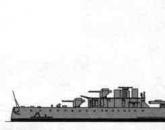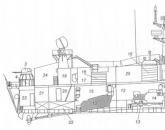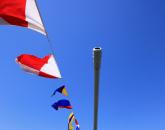The program "young leaders" - a personnel reserve. The Presidential Program is a great start for young leaders Benefits of participating in the Presidential Program
Starting a career is an important step. From the first day of work in the company, not a single employee of L'Oréal is left without attention. The peculiarity of the young managers development program (Management Trainee Program - MTP) lies precisely in the individual approach to each of its participants.
More about the development program
Practical experience in the company is gained through rotation in several departments within the company. An individual development plan is developed for each participant, taking into account his interests and the capabilities of the company, as well as an on-the-job training program.
At L’Oréal, the Young Manager Development Program lasts 1 year, during which you have a unique chance to gain experience in different departments:
- Marketing
- Sales department
- Finance
- Logistics
- Procurement
- Production
- Personnel service
You will be able to understand the interaction of various departments and business units with each other, the specifics of their work and, importantly, establish business contacts. You are assigned a personal mentor who will help you navigate the organization in the first months, answer your questions, and also act as an experienced adviser.
The development and rotation of program participants, even in one functional area, can vary greatly. Several examples can be given.
Program young specialist who wants to become a brand manager, may consist of the following departments:
- 3 months - PR or marketing research department,
- 3 months - marketing
- 6 months - sales department
The program of the future financier may include:
- 3 months in the purchasing department
- 3 months in marketing or finance
- 6 months in the sales department
For a future professional in commerce, the program might look like this:
- 3 months in trade marketing
- 6 months in the sales department
- 3 months in logistics
How to participate in the development program?
Requirements for candidates
- University graduate or final year student
- Ability to work full time
- Fluency in English and/or French
- Work experience no more than 3 years
How to apply
You can send your resume to us through the online system
- Employees included in the personnel reserve.
- Young managers appointed to positions without management experience.
- Managers with managerial experience without managerial training.
Criteria for selecting students for the program:
- Conclusion attestation commission on the inclusion this employee to the personnel reserve.
- Request from immediate supervisor.
- Personal application from a potential employee.
Program goal:
Training of professional managers who own progressive tools for operational and strategic management divisions.
Tasks:
- Formation of a holistic view of the management system.
- Development of managerial competencies in accordance with professional standards enterprise quality.
- Developing the ability to make effective decisions in uncertain circumstances and crisis situations.
- Mastering the methods of revealing the potential of employees, the formation of a workable team.
- Ensuring your enterprise professional leaders able to work in accordance with professional quality standards.
- Increasing the competitiveness of the enterprise foreign market through qualified management personnel.
- 100% coverage of employees of the enterprise from the potential category of the personnel reserve, to participate in the program.
Training period:
The total duration of the medium-term training program: 124 academic hours.
Training time - 4.5 months.
Abstract (feature) of the program:
1. The Young Manager School program is aimed at the scientific and practical aspects of developing the managerial potential of employees in accordance with the professional standards of your company.
2. The program is implemented through a modular training system (6 modules in total), where each module is a complete block for the formation of certain competencies of a young leader.
A module is a learning session that includes:
- theoretical part (distance learning)
- control slice of knowledge
- workshop (trainings, business and simulation games)
- protection of the working draft in a remote format via videoconferencing.
At the end of the program, a diagnosis of the "growth" of competencies at the output is carried out using an automated assessment.
3. A variety of advanced, interactive forms of learning (distance format, multimedia, business and simulation games, etc.) helps to increase the involvement of employees in the learning process and motivation for development and self-improvement.
The portfolio of competencies of the student of the program "School of a young leader":
Learning modules:
| Training module | Training module | Developed professional competencies | |
|---|---|---|---|
| 1. Activity management |
|
4. Quality management |
|
| 2. Resource management |
|
5. Information management |
|
| 3. Self-organization |
|
6. Personnel management |
|
Training schedule:

The ratio of theory and practice - 20% to 80%
Volume of the practical part: 106 hours

Forms, teaching methods (cases, active methods, etc.):
The program involves advanced, interactive forms of education:
- remote format
- multimedia tools (video conferences, audio files, graphics, animation)
- practical cases
- role-playing games
- business and simulation games

Resources:
Business games are held with the presentation of the results of work on the screen of a multimedia project.
In practical cases, a PC, Mikrosoft Excel spreadsheets are used (presentation of the results of work on a case on the screen of a multimedia project).
Computer business simulation game SimulTrain (Project Management).
When participants protect working projects, video conferencing is used.
Forms and methods of monitoring learning outcomes:
3rd control of learning outcomes:
1. Presentation of work projects upon completion of each module (topics may vary depending on the actual tasks of the enterprise).
2. Conducting a system for assessing managers on managerial and personal competencies.
3. Drawing up a plan for the goals and objectives of self-development (introduction of management tools) of a young leader (indicating the exact timing and format of the result) after the completion of the training program and its implementation.
Duration of training: 8 months (550 academic hours)Training format: full-time/day, modular
Teaching language: Russian
Who is this program for?
target group for training within the framework of the State Plan are promising senior and middle managers (hereinafter referred to as specialists) of organizations National economy Russian Federation(hereinafter referred to as organizations).
Issued documents
Upon completion of the program, a diploma of vocational retraining is issued.
A professional retraining diploma entitles you to practice professional activity in the field of management, taking into account the chosen direction of training (management, finance and credit).
- For some specialists (who do not have a higher economic, legal or managerial education), this will be the new kind professional activity.
- For other listeners (having higher education in the named areas of training) it will be the implementation of activities in the field of management at a new professional level.
Persons who have successfully completed their studies under the Presidential Program have the right to continue their studies in the second year of the program "Master business administration» at the Far Eastern Federal University.
Program description
The presidential training program for young managers of Russian enterprises has been implemented since 1997.
The strategic goal of the Presidential Program is to improve the quality of management at domestic enterprises to the international level. As part of the Presidential Program, 5,000 managers annually undergo 550 hours of training in leading Russian educational institutions in the enlarged group of specialties and directions "Economics and Management". In Primorsky Krai, the educational institution implementing the program is the Far East federal university. Training is conducted in the areas professional retraining « Production management and Financial Management.
After completing training in educational institutions, program participants are given the opportunity to undergo internships at specialized Russian or foreign enterprises.
The level of changes in the field of introduction of new technologies at enterprises participating in the Presidential Program is almost twice as high as the average data for industrial enterprises Russia. Thanks to the fulfillment by specialists of project assignments developed during the training process, about 400 new enterprises are created in Russia every year, the order of attracted investments for Russian enterprises is measured at 300 million euros, and the average reduction in production costs is 10%.
Learning outcome:
Participation in the management training program provides an opportunity for specialists to:
- take a special (exclusive) training course and get professional knowledge;
- participate in internships at leading Russian and foreign enterprises;
- establish business and friendly contacts with Russian and foreign colleagues;
- be included in the specialized federal information base data for the purpose of using it to form a federal and regional personnel reserve;
- become members of associations of graduates of the Presidential Program;
- improve possession skills foreign language(if necessary).
Entry requirements:
- higher education;
- total work experience of at least 5 years;
- At least 3 years of experience in managerial positions;
- the concept of the project (project idea) of the development of the organization, supported by the employer.
The Presidential Management Training Program for National Economy Organizations is Government program professional development of managers, which has been implemented in Russia since 1998. The main goal of the program is to provide organizations of the national economy of the Russian Federation with highly qualified specialists in the field of management and organization of production that meet modern requirements of the economy, able to work effectively in market conditions who are familiar with the management culture and experience of leading foreign countries.
The Presidential Program is being implemented in the Russian Federation in accordance with the Decree of the President of the Russian Federation of July 23, 1997 No. 774 "On the training of managerial personnel for organizations of the national economy of the Russian Federation" and the State plan for the training of managerial personnel for organizations of the national economy of the Russian Federation in the 2018/19 academic year (Further - state plan), approved by Decree of the Government of the Russian Federation of February 13, 2019 N 142 (Collected Legislation of the Russian Federation, 2019, No. 7, Art. 670 (hereinafter referred to as the State Plan), approved by Decree of the Government of the Russian Federation of March 24, 2007 No. 177.
RANEPA has been involved in the implementation of the Program since its inception and has been a leader in terms of the quality of professional additional education among Russian universities accredited to participate in the Program. Every year, about 400 middle and top managers of enterprises and organizations of all sectors of the national economy of the Russian Federation, including municipal employees in the status of a leader, are sent to study under the Presidential Program. The geography of listeners extends to all subjects of the Russian Federation.
The presidential program is designed to improve the quality of work of senior management in accordance with leading international standards. Graduates of the program are included in a specialized federal database for the subsequent formation of a reserve of managerial personnel.
Benefits of participating in the Presidential Program:
- Passing a unique course vocational training for management professionals;
- Internship at leading enterprises in Russia and abroad;
- Entering the management elite of the Russian economy;
- Increasing the level of foreign language proficiency;
- The opportunity to significantly improve their managerial competencies;
- Participants and graduates of the Program have the opportunity to take part in various events, meetings, seminars aimed at developing managerial competencies, assist in the development of entrepreneurship, expand interregional and international relations and etc.
Stages of the Program implementation:
- Competitive selection of specialists.
- Walkthrough curriculum based on RANEPA.
- Internship in leading Russian or foreign organizations. After completing training in educational institutions, program participants are given the opportunity to undergo internships at specialized foreign enterprises. Foreign internships are held in Germany, Ireland, Italy, the Netherlands, Norway, Finland, France, Japan.
- Implementation of an individual project assignment.
Funding for training
- 34% of the cost of training is paid by the sending organization or personally by the participant of the program from their own funds;
- 66% of the cost of education is compensated from the budget.
Requirements for participants of the Presidential Program
- age up to 40 years;
- availability of higher education;
- work experience: total - at least 5 years, in managerial positions - at least 3 years;
- applicants for participation in the program must present on a competitive basis the concept of the project that they plan to develop during the training;
- knowledge of a foreign language is required.
Implementation of the Program in the branches of the Academy
Since 2014, branches of the RANEPA have been actively participating in the implementation of the Program. They implement both basic and project-oriented programs, as well as the City Manager advanced training program (120 hours), focused on municipal employees.
THE PROGRAM "YOUNG LEADERS" - personnel reserve. Managers up to 35 junior and middle management with good (A and B) performance. "SCHOOL OF MANAGER" People and process management - training + business game "Manager and team" (assessment + development) Department management - seminar and business game on VSP management (based on PSS) Excellent service - training using business cases and role playing Project management - blended learning: training, distance courses, business game Business planning and financial modeling - practical course and business game "Bank Management" Change management - training and business game based on the PSS. Assessment of intellectual and leadership potential in several stages. Active involvement in the deployment of the PSS Formation of a personnel reserve from among the active participants of the PSS PSS as a development project for reservists. Targeted communication of the Bank's strategy and profile strategies and knowledge testing.
Slide 31 from the presentation "New technologies in work with personnel"Dimensions: 720 x 540 pixels, format: .jpg. To download a slide for free to use in a lesson, right-click on the image and click "Save Image As...". You can download the entire presentation "New technologies in working with personnel.ppt" in a zip archive of 2227 KB.
Staff
"Personnel Management" - The use of indicators in the analysis of job requirements. Job Descriptions. Job title. Valuation of available resources. Registration of pension insurance. The procedure for maintaining documentation. Qualification requirements. Type of work, types of activities that it includes. Responsibility and authority.
"Trade unions and labor collectives" - Market labor resources. Place and role of the trade union. Formation principles. Labor Code for minors. The results of the analysis of excerpts from the laws of the Russian Federation. The role of the trade union. social interests. Key concepts. unions and labor collectives. Factors affecting the level of wages. labor interests.
"Employees of the enterprise" - Employees of industrial and production personnel are divided into two main groups - workers and employees. For example, economists are divided into planners, marketers, financiers, etc. In the group of employees, the following categories of employees are distinguished: The payroll includes all employees hired for work related to both core and non-core activities.
"Personnel statistics" - The natural method involves accounting for products. Indicators of the use of working time. Relationships. The staff of an enterprise (firm) is a set of individuals. Methods for measuring the level and dynamics of productivity. The balance of personnel movement of the enterprise. Enterprise workforce statistics. Analytical indexes.
"Collective agreement" - Additional guarantees. Non-monetary forms of payment wages. The amount of monetary compensation. Duration daily work. Monitoring the implementation of the collective agreement. Why does an employer need a collective agreement? Annexes to the collective agreement. Tariff wage systems. Collective agreements, agreements.
Popular
- Submarines of the Gato type
- Insignia on the merchant fleet of the USSR Detachment of the II group
- How to maximize the speed of your Internet connection Choosing the best browser
- Productive ways to spend time online
- Hiding VKontakte photos
- Tim Berners-Lee - creator of the World Wide Web
- Start in science Net weight of eggs without shell = - - - - - - - - -
- How to delete photos in classmates How to remove tinsel from a photo on classmates
- How to add a photo in a contact?
- Tatyana Gordienko: Other designers copy me and I'm happy about it!




